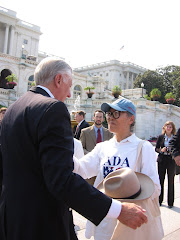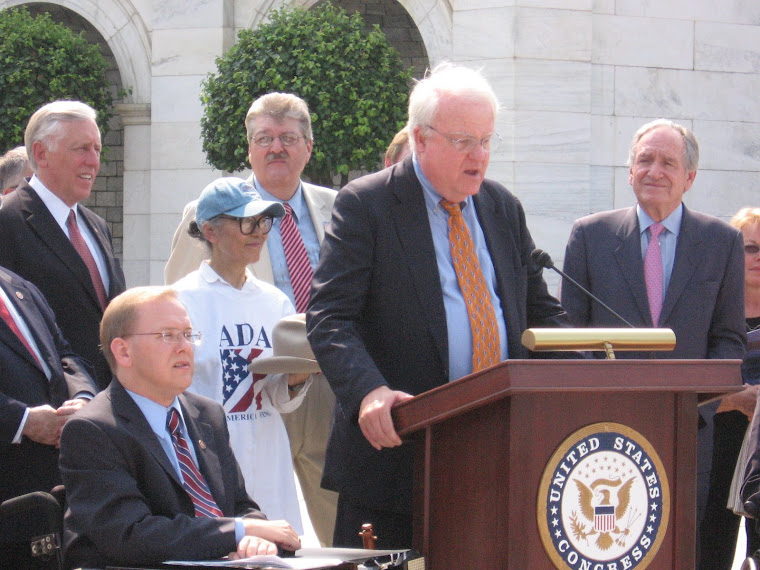The ADA Restoration Act hearing in the Senate Health, Education, Labor, and Pensions(HELP) Committee, while poorly attended by Members (only Senator Tom Harkin (D-IA) and Senator Patty Murray (D-WA) attended), nonetheless delivered a strong message to the Congressional record of its need.
Senator Harkin (D-IA), the lead sponsor of the Senate bill, S.1881, began the hearing by addressing his involvement with the original ADA, what Congress intended, and some of the Supreme Court decisions that have brought us way off course with this great law.
Long time disability rights leader John Kemp, at attorney in Washington, D.C., was first to speak from the panel. Mr. Kemp spoke of his personal experience having grown up without arms or legs and stated that disability discrimination is "un-American."
Dick Thornburgh, Attorney General under Former President George H.W. Bush, like Senator Harkin, spoke of his role in the passage of the original ADA and what he understood Congress's intent to be.
Steven Orr, a pharmacist with Type 1 diabetes from South Dakota, spoke next. Mr. Orr, who wears an insulin pump, detailed his experience of discrimination by his employer who flat out told him he was firing him because of his diabetes but who nonetheless lost his case when the Courts determined that he was not "disabled" for purposes of the ADA's protections.
Camille Olson, an attorney and professor from Chicago, offered an oppositional viewpoint. While noting all the progress in the workplace to date on account of the ADA, Ms. Olson argued that the ADA Restoration Act of 2007 is not a suitable solution to address concerns with the ADA, arguing that the legislation included too many people with all varieties and severities of impairments in its protections.
After Ms. Olson spoke, Senator Patty Murray (D-WA), who joined the hearing after Mr. Kemp's testimony but who left after Ms. Olson's, asked for a few minutes to make remarks before having to excuse herself to another Senate obligation. Senator Murray first thanked Senator Harkin for drawing attention to the problems the courts have created for people with disabilities under the ADA. She shared that her father had spent much of his life in a wheelchair on account of muscular sclerosis and that she remembered vividly life before the ADA - having to make numerous calls and other inquiries regarding parking and accessibility just to have a family outing. She said if her father was still alive, he would most assuredly not want to think progress was retreating. The Senator also made mention of the large numbers of returning vets with Post-Traumatic Stress Disorder (PTSD) and Traumatic Brain Injury (TBI) and noted the importance of this topic on their interests.
Chai Feldblum, a law professor at Georgetown University Law Center, spoke last on the panel, and provided a detailed legal perspective from the beginnings of the ADA, of which she played an integral role, to the present erosion of its intended protections on account of Supreme Court rulings. Ms. Feldblum took several of Ms. Olson's points head on, addressing both points she made in her oral as well as written testimony with powerful counterarguments and passionately dismantling many of her claims.
After noting that this hearing was only the first of several hearings to come on this bill, Senator Harkin asked a number of questions of the witnesses before adjourning the hearing approximately two hours after it began.
An archived webcast of the hearing is available (uncaptioned), and transcripts are expected in coming weeks.

Thursday, November 15, 2007
Subscribe to:
Post Comments (Atom)


3 comments:
here is the working url to the webcast: http://help.senate.gov/Media/2007_11_15.ram
The actual hearing begins about 18mins into the webcast...
enjoy!
I just changed the link in this post and on our JFActivist blog as well.
Good catch!
Thanks, Joe!
Anne
fat burning furnace -
fat loss 4 idiots -
final sync -
firewall gold -
fitness model program -
fit over 40 -
fit yummy yummy -
flattenyourabs -
flatten your abs -
forex candlesticks made easy -
forex killer -
forex megadroid -
get rid of your cellulite -
g money pro -
google shadow -
governmentregistry -
government registry -
gov resources -
health biz in a box -
homemadeenergy -
home made energy -
hybrid water power -
i software tv -
joyful tomato -
keyword spy pro -
kingdom of pets -
macro virus -
malware bot -
maternityacupressure -
maternity acupressure -
meet your sweet -
microcap millionaires -
moles warts removal -
mole wart removal -
Post a Comment